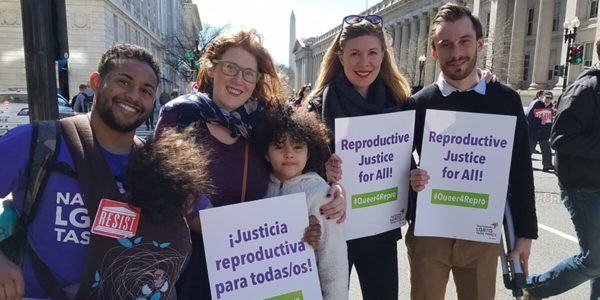
Candace Bond-Theriault, Esq., LLM
Senior Policy Counsel,
Reproductive Health, Rights & Justice Democracy Project Director
Pronouns: she, her, hers
Deciding whether or not to have a family is one of the most fundamental questions that people ask themselves. And if you are LGBTQ+ and not a part of a cis-gendered, hetero-couple, there are so many barriers to overcome to have children, which makes an already difficult decision that much harder.
We should all have the ability to access reproductive health care with dignity, in order to make such a personal decision.
Queering Reproductive Justice is a framework that is rooted in human rights and is the result of a merger of LGBTQ+ liberation and reproductive justice. LGBTQ+ liberation is about creating and cultivating resources that will lead us toward collective liberation. Reproductive Justice is both a movement and framework, working to ensure that all folks have the right to decide whether or when to become a parent, parent the children we have, and to do so with dignity and free from violence and discrimination.
Queering Reproductive Justice will be achieved when all people, of all immigration statuses, have the economic, social, and political power and resources to define and make decisions about our bodies, health, sexuality, families, and communities and we have the ability to live our lives with dignity and self-determination.
By Queering Reproductive Justice, our goal is to ensure that our advocacy in all areas is as holistic, comprehensive, and intersectional as people’s lived experiences.
Right now, there are two important rules, considered Health Denial rules that will likely affect folks in the LGBTQ community and cis-gender women. In May, the Department of Health and Human Services (HHS) issued a finalized “Conscience Rule” that allows health care professionals to refuse to give care to a person if they believe doing so would violate their personal religious beliefs.
The second is an attempt to roll back provision 1557 of the Affordable Care Act (ACA), which protects individuals from discrimination on the basis of race, color, national origin, sex, age, and disability in certain health programs or activities.
The current regulation interprets discrimination on the basis of sex to include gender identity and expression and sex stereotyping, which covers discrimination against LGBTQ people and pregnancy-related conditions, including having had or seeking an abortion. The Trump Administration proposed new rule rolls back these and several other protections in healthcare.
By Queering Reproductive Justice and keeping the language patient and people-centered (instead of gendered), we help ensure that comprehensive reproductive health care is available to everyone, without misconceptions about who needs what. When we can remove assumptions about someone’s most personal family and health decisions, we are helping to ensure that everyone gets their unique needs met. We are also breaking down barriers and lifting the voices of those who are the most marginalized.
I am so grateful that working for the Task Force gives me the opportunity to work on an issue that is so important to so many of us and fundamental to our rights as human beings.
